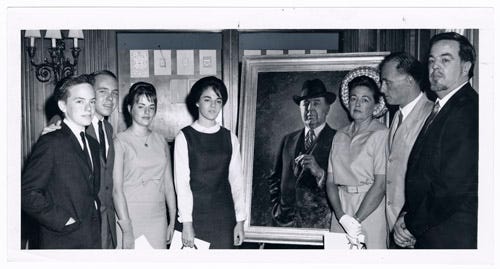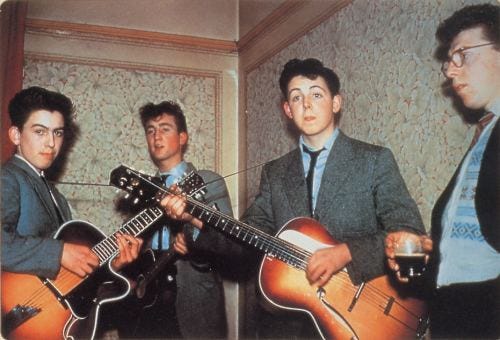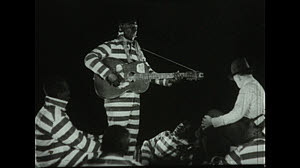Monday Morning Minute: Leadbelly and the Lomaxes
Blues/folk legend gave his final concert in Austin in 1949
It’s well known that Hank Williams played his last concert at the Skyline Club on North Lamar on Dec. 19, 1952. But Austin can also claim the last headlining date by another musical legend, Huddie “Leadbelly” Ledbetter, who performed on June 15, 1949 at Hogg Auditorium, in tribute to former mentor John A. Lomax who passed away the previous year at age 80. Leadbelly would be dead by the end of ‘49, a victim of ALS (“Lou Gehrig’s Disease”).
Their collaboration had ended in March 1935 with a knife pulled, but Leadbelly (sometimes credited as “Lead Belly”) couldn’t forget what John Lomax had done for him, including helping free him from prison. Plus, the UT gig was probably a good payday.
The Lomax family can be credited with giving Austin a reputation as a city of song, going back to 1910 when patriarch John Avery Lomax created a national fascination for folk music with Cowboy Songs and Other Frontier Ballads. The UT administrator’s informative songbook preserved such now-standards as “Home on the Range,” “Streets of Laredo” (as “The Cowboy’s Lament”), “The Old Chisholm Trail,” “Jack o’ Diamonds,” “Git Along Little Doggies” and “Jesse James.” Blind musician/teacher Henry Lebermann (the grandfather of future City Councilman Lowell) and wife Virginia were hired to transcribe those songs and many more into sheet music from crude field recordings on wax cylinders.

Based in Austin and curating the Archive of American Folk Song in D.C., the Lomaxes lived to keep songs of the working-class people alive, road-tripping all over the continent. They found and recorded “House of the Rising Sun” in Kentucky, “Sloop John B” in the Bahamas, and Muddy Waters at Stovall Plantation in Mississippi.
Their greatest find came in July 1933 at the Louisiana State Penitentiary with a prisoner called Leadbelly, who played a twelve-string guitar and sang in a powerful baritone. If they hadn’t hauled a 350-pound disk recorder, powered by two seventy-five pound batteries, from Austin to Angola, LA., “Good Night, Irene” might’ve rotted behind bars or escaped into thin air. Instead, the recording was archived at the Library of Congress and in 1950 helped launch the folk music revival when the Weavers took it to #1 on the charts.

Leadbelly’s recording of “Rock Island Line,” a tune John and Alan found in an Arkansas prison in 1934, would have an even greater impact. Covered by Lonnie Donegan in England in 1955, that sped-up and washboard- driven version gave birth to skiffle, which influenced an entire generation of British musicians who weren’t yet musicians. “We all went out and bought guitars,” said Paul McCartney, who formed the Quarrymen with John Lennon in 1957.
Neither John Lomax nor Ledbetter, whose professional association lasted less than a year due to monetary disagreements, would live to see the broadness of their influence. Other songs written or popularized by Leadbelly include “Black Betty,” “Cotton Fields,” “Midnight Special,” “Gallows Pole” and “(Black Girl) Where Did You Sleep Last Night?”- covered by the likes of the Beach Boys, Led Zeppelin, Creedence Clearwater Revival and Nirvana.
Leadbelly'‘s swan song at Hogg in June ‘49 was recorded and eventually released in 1973 on the short-lived Playboy label. KUT is credited with recording the concert, but since that radio station didn’t launch until 1958, it was most likely the Radio House mobile recording unit from the College of Fine Arts that got it down on transcription discs. You can listen to Leadbelly’s last concert in its entirety on the YouTube link above.




Another fine entry in your Austin music history work, Michael. I hope that many of Austin's new residents learn about LeadBelly and how Austin would not be Austin without such vital artistic giants.
Michael this is a truly extraordinary account of the achievements of my amazing family and one which will go a long way towards helping prove the thesis that were it not for the Lomaxes there might not have been a Beatles, Rolling Stones or Animals, much less dozens of other great artists their work spotlighted!